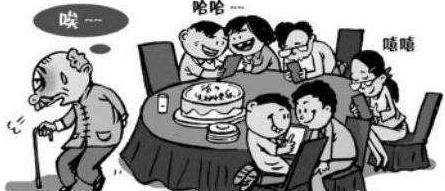Question: "How can I receive such articles every day?"

In ancient society, colloquialisms were one of the common languages of the people, generally short and concise, easy to understand, and widely popular.
As an ancient civilization, China has advocated filial piety since ancient times, so in the long history of thousands of years, there have been many sayings about filial piety, such as "the mother is not celebrating the birth, the father is not leaving a beard", which is one of them.
01
The mother is not celebrating the birth
Taken literally, this sentence tells us that children should not celebrate birthdays while the mother is alive. Why did the ancients have such strange ideas?
In fact, the "birthday celebration" said by the ancients does not mean birthday, but refers to "birthday".
According to the ancient etiquette system, young children, young people, and middle-aged people cannot live a long life, and only after 50 years old can they be called a birthday.
According to the "Zhou Li", sixty is the lower life, eighty is the middle life, and one hundred years old is the upper life.
And even if you are over 50 years old, but your parents are still alive at home, it is best not to do a birthday, because "respecting relatives do not dare to speak of old age", which reflects a kind of respect and filial piety for the elderly.
So why did the ancients deliberately emphasize: "Mother is not celebrating the birthday"? This is mainly because the medical conditions in ancient times were backward, and the probability of accidents in women giving birth to children was very high.
So the day of the child's birthday is also the most dangerous and painful day for the mother who gives birth.
Chinese the most important filial piety, especially the mother's October pregnancy, as well as the hardships and hardships of childbirth, should be worth remembering every child.
The person who knows the most about gratitude naturally does not celebrate his birthday on the most painful day of his mother, which is why he has this saying.
In addition to admonishing children to understand gratitude, this sentence has a deeper meaning, that is, to warn children:
When you have the opportunity, you still have to be more filial to your parents, don't just care about your own birthday, and forget your mother's birthday, while the old man is still alive and often goes home to see.
As the saying goes: "The tree wants to be quiet and the wind is not stopping, and the son wants to raise and not to be kissed", don't wait until then to regret it.
Especially today's young people, who like to hold birthday parties with friends outside, always can't remember their mother's birthday, leaving only the elderly at home to look forward to it.
As a child, please go home often in the future, spend more time with your parents, so that they can spend a happy old age with their children and grandchildren around their knees.
02
The Father is not bearded
Many people do not understand this sentence, in ancient China, men would grow beards when they reached adulthood, and only a very small number of people did not grow beards (such as eunuchs).
Moreover, Confucianism warns the world: "The skin of the body, the parents of the body, do not dare to destroy it." ”
In ancient times, beards were the standard for beautiful men, and the Book of Han described Liu Bang's appearance as follows: "Gao Zu was a man, long and long," and had beautiful beards." ”
The famous beautiful man Huo Guangze: "White, sparse eyebrows, beautiful beard." ”
There is also Wusheng Guan Gong, known as the Hairdresser, with a beard up to two feet long.
Obviously, the ancients grew beards when they reached adulthood, so where did the saying "the Father does not keep his beards" come from?
In 1911, revolutionaries launched an uprising in Wuhan, forcing the Qing emperor to abdicate, ending thousands of years of feudal history in China.
In order to change the feudal and backward thinking of the Chinese people, the revolutionary party abolished many of the bad ideas in Confucianism, such as "the skin of the body, the parents, do not dare to destroy." "Encourage men to cut their braids and shave.
Later, a custom was formed, parents are alive, no beard, the father died, left the upper lip beard, the mother died, leaving the beard, both parents are dead, will be up and down together to grow a beard.
Now you can see mr. Lu Xun's photos, almost all of which have upper lip and beard, which is what he left to commemorate his deceased father.
However, in modern society, people's aesthetics have undergone earth-shaking changes, and those white-skinned "small fresh meats" have become the object of people's pursuit, and many men have long ceased to have beards.
In fact, the love of parents for their children has always been selfless, and the rain is silent, and they will not really care about whether their children live for themselves or not.
Their dedication to their children is selfless and unrequited.
In ancient times, there were twenty-four filial pieties, and there were filial pieties that cut meat and serve their mothers, and modern young people should also uphold the traditional virtues of the Chinese nation, continue to carry forward filial piety, and often go home to see their parents.
Parents are only looking forward to family reunion, children and grandchildren around the knees, no matter whether there is money or not, as long as the whole family is happy and happy!